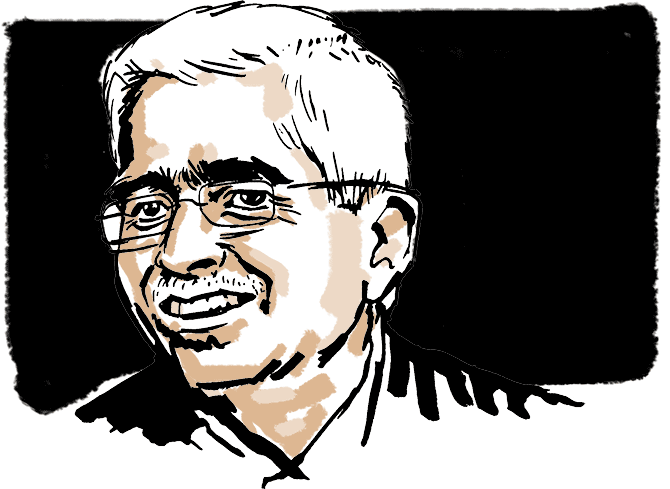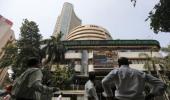'Consequent to the rate cuts by the RBI, the accommodative stance, the hugely surplus liquidity in the system right from June 1 onwards, and yields on government securities coming down by over 100 basis points since the first policy rate cut in February, there is definitely a case for bigger and faster transmission of rates, at least in respect of new loans.'
'It is necessary to have an effective interaction between the government and the RBI in the interests of the economy and in the interest of the overall financial sector.'
Illustration: Dominic Xavier/Rediff.com

Reserve Bank of India Governor Shaktikanta Das tells Anup Roy, Raghu Mohan and Niraj Bhatt that it is time for banks to lower interest rates and start lending to cash-starved finance companies after due credit appraisal and proper risk assessment. Edited excerpts:
Why are policy rate cuts not being transmitted to lending rates at banks?
The cost of funds of banks is one of the factors, which impacts lending rates.
Banks are gradually recovering from stress in their balance sheets due to overhang of non-performing assets (NPAs).
Going forward, I don’t think NPAs will be a major impediment in transmission of the monetary policy rates.
Most of the large public sector banks (PSBs) are not under prompt corrective action framework (PCA).
Of the 11 banks that were under PCA, six have come out.
The remaining five we are monitoring, and we expect them to improve their performance.
There is definitely a case for bigger and faster transmission of rates, at least in respect of new loans.
But with policy rates and yields being low and liquidity sufficient, what else do banks want?
Banks may have constraints, which they need to address for faster transmission.
Deposit growth has been in the region of 10-11 per cent.
There was this NPA issue that is gradually getting resolved.
But yes, consequent to the rate cuts by the RBI, the accommodative stance, the hugely surplus liquidity in the system right from June 1 onwards, and yields on government securities coming down by over 100 basis points since the first policy rate cut in February, banks should pass on the rate benefit to customers.
That is precisely the point I have highlighted and stressed in our interaction with PSBs.
The conditions are absolutely conducive for faster transmission of interest rate cuts, I repeat, at least for new loans.
In old loans, there are some rigidities as there are certain rates of interest which are locked in for certain periods of time, and it may take time.
I will be having an interaction with private sector banks also sometime next week.
This issue will also be discussed with them.
Are high rates in small savings an impediment?
Small savings rates do play a role.
But, it also needs to be seen from two different angles, one is that they are a fiscal support, which the government is giving to certain needy sections.
Rates are higher in the senior citizen scheme, or in public provident fund.
We must also consider that the overall share of small savings schemes in total deposits is very low.
Therefore, it should not play a major role as an impediment to rate cuts.
The IMF has cut India’s growth forecast. What is the RBI’s own forecast looking like?
The next meeting of our monetary policy committee is due on August 7.
So, currently our research teams are working on GDP numbers taking into account the latest data available.
How will global trade tensions play out for India?
We are not part of the global supply chain that much. So to that extent, we are insulated.
But, definitely in the medium and long term, it will have an impact on India’s exports and manufacturing.
Our exports do have a major role, particularly in critical sectors like the information technology sector and the sectors related to intellectual property rights, and even other export sectors like textiles.
So overall, if trade tensions lead to a contraction in global demand, they will have an impact on Indian exports and in the long run, India will definitely be impacted.
You cannot take India and look at India in isolation from global developments.
What is the possibility of a currency war in this scenario?
Post 2008, there is a greater understanding and coordination among countries and central banks on currency issues.
We have regular meetings through the G-20, the forum of central bank governors’ meetings under the aegis of G-20, plus the Bank for International Settlements meetings among major central banks every two months.
There is a greater coordination, and a greater interaction of thoughts and views.
The common understanding that has emanated from the meetings in the last few years is that any decision with regards to monetary policy expansion or roll back, especially by advanced economies, have to be preceded or accompanied by the right communication, and any expansion or roll back will have to be calibrated.
This is because decisions by developed countries’ central banks such as US Federal Reserve or the European Central Bank will have a much greater impact globally.
Their monetary policy stance impacts the currency situation and financial market conditions throughout the world.
Does that automatically prevent the possibility of a currency war?
I would think so.
Why are central banks, including the RBI, buying gold these days?
We have a committee for reserves management that works on asset allocation, which takes major directional decisions.
For deployment of reserves, there is a clear understanding about how much should go into bonds, how much should go into gold assets and, within bonds how much should go into each country.
Also, we have set criteria that say there should be safety, liquidity and return on our investments, in that order.
Therefore, a certain portion is also held in gold as part of our asset diversification strategy.
What’s your view on the sovereign bond issue? Do you fear losing the internal debt management mandate?
As already articulated by me, the RBI is the debt manager to the government.
There is a process of consultation between the RBI and the government on every issue relating to borrowing. And in the present case also, the process of consultation is very much on. We have already communicated our views to the government.
We will continue to engage with the government and give our views.
Whatever the RBI needs to say, we will say it to the government directly.
Will the RBI help in bringing down the forward rates by doing more dollar swaps?
We did dollar swaps to infuse liquidity in the backdrop of a large amount of open market operations (OMOs) that were done in the previous financial year.
Obviously, after doing so much of OMOs, the RBI had to look at other instruments to infuse liquidity.
One of the collateral benefits of the swaps was that forward rates came down.
But, we did not do dollar swaps to bring down forward rates. It was one of the collateral benefits.
You have provided liquidity to non-banking financial companies (NBFCs) through banks, but why are they not extending credit to the sector?
I now expect better flow of credit to the NBFC sector.
The government has announced in the Budget that it would provide partial guarantee on qualifying assets purchased by PSBs from NBFCs.
On the same day, we issued a press note assuring adequate liquidity for the banking sector to meet the liquidity requirement of NBFCs.
We have made available an additional Rs 1.34 trillion to the banking system.
We have assured banks in very clear and unambiguous terms that adequate liquidity will be provided to them to on-lend to the NBFC sector.
Banks are making their own assessment of individual NBFCs, and the lending cycle should start to gather momentum.
The RBI’s June 7 circular on the resolution of stressed assets framework has also to be kept in mind in this context, which places the responsibility on banks.
The framework now gives enough flexibility to banks and gives them a bigger role to be proactive and resolve stressed assets, including NBFCs.
Even as we are speaking, it is now mandatory for banks to sign the inter-creditor agreement.
In a few cases, they have already signed agreements and are trying earnestly to resolve the stressed assets issue.
These two things taken together, it should improve fund flow to the NBFC sector.
But banks believe lending to NBFCs is risky…
While we are impressing upon banks that there is a need for credit flow to the NBFC sector, as also to other sectors, we have to also recognise that banks have to follow the principles of due credit appraisals and proper risk assessment.
Perhaps, there was initially some credit aversion.
But now I think that is getting clear and in fact, the commercial paper rates have also come down from January.
So therefore, there should be flow of credit.
You have said earlier that the RBI is monitoring large NBFCs. Can you give some details?
We have undertaken very close monitoring of the top 50 NBFCs and that includes some housing finance companies (HFCs), as well.
We have selected these NBFCs on the basis of their balance sheet size and credit behaviour in the past.
We have a good understanding of what the numbers and cash flows of these firms are.
After all, the RBI is entrusted with the responsibility of maintaining financial stability.
We also sensitise banks on the issues in the NBFC sector that need to be dealt with.
I think the credit flow will gather greater momentum very soon.
Why did you want to regulate HFCs?
There is a lot of interconnectedness between HFCs, banks, NBFCs and other financial intermediaries.
Given the kind of inter-connectedness that has happened over the last few years, it is desirable that there is one regulator that deals with all these financial intermediaries.
If you see currently, there are problems in the HFC segment, and that, in turn, are impacting the banking and the NBFC sectors.
There have been some concerns that the RBI doesn’t have adequate powers over PSBs such as changing their boards. Your view?
The law is very clear. In the context of private sector banks, the RBI enjoys certain powers, which it doesn’t enjoy in the context of PSBs.
But I don’t see that as a handicap in the RBI’s regulatory or supervisory functions as banking regulations are applicable to private, public and foreign banks also.
In case of supervision, we have got identical powers for all of them.
So in regulation and supervision, we have enough powers and there is no differentiation between public sector and private sector banks.
In areas where we do not have power, such as changing the management of public sector banks, if there is a situation and if the RBI feels that some changes need to be undertaken, the RBI can always discuss with the government and the government will definitely give due weightage to RBI’s views.
What we want to achieve in the case of PSBs, we can always do it through the government.
I don’t see anything being a handicap for the RBI to carry out its duty as an effective regulator.
What about governance reforms in PSBs?
In one of my recent speeches, I have already highlighted the need for governance reforms in both public and private sector banks.
The government has also announced in the Budget the need for governance reforms.
We have given our suggestions to the government on such reforms, broadly in the areas of accountability, performance review, tenure, remuneration, etc.
It seems the RBI and the government have agreed to not disagree on issues, unlike what we have seen in the recent past where the differences were played out publicly. Is it because of your civil services background that you strive to maintain a balance with the government?
That is for others to judge really, whether my civil services background is helping or not.
What I believe is what I had articulated on the first day of my joining here.
I had clearly said that there has to be consultation between the RBI, the government, and other stakeholders.
And, I had also said that the government is much more than a stakeholder.
It is necessary to have an effective interaction between the government and the RBI in the interests of the economy and in the interest of the overall financial sector.
That also gives a better understanding of the overall situation and definitely fine-tunes and contributes to the quality of the decision-making.
There are certain things that the RBI cannot do without the government’s support.
For example, the amendment to the RBI Act to give additional powers to the RBI in the case of NBFCs, or entrusting powers to the RBI to regulate the HFC sector.
Similarly, there are certain areas where the government shares its concerns with the RBI and the RBI considers and acts on that.
For example, the government is focusing on less-cash economy, or deepening digital transactions and there are a lot of discussions on these issues with RBI.
Unless there is proper interaction and engagement, it is difficult to achieve the broader objective.
Therefore, I don’t see any conflict.
But yes, there could be differences of opinion, and that is quite natural, which have to be resolved through discussions.
The RBI did not cut rates for a long time even as the government openly advocated cuts. But you have cut rates thrice in six months and changed the stance to accommodative. Is that something done after both views converged to form a uniform one?
When the monetary policy committee (MPC) first met under my chairmanship, the MPC obviously considered inflation and inflation outlook, growth and growth outlook prevailing at that time.
The view of the MPC was that there was a necessity for a rate cut.
We did that rate cut and followed it up twice.
If you leave out the government, even outsiders such as analysts and academicians supported the rate cuts.
It’s a question of how the economy evolves and what the requirement of the economy at particular points of time is.
Are you comfortable transferring a substantial portion of the RBI reserves?
A committee has been constituted for this.
The report of the committee is expected shortly.
When the committee report comes, we will see and I am sure the committee will take a very considered call after examining all aspects.
Why has RBI decided to raise a dedicated cadre for regulation and supervision?
It was considered necessary because you need to build expertise with a dedicated workforce to handle complexities of business models that are coming up fast and the kind of interconnectedness between the major players such as banks, NBFCs, and other financial intermediaries.
Given this, we need to build greater expertise and professionalism with regard to regulation and supervision.
So we decided to build a separate cadre where people remain within that cadre and their experience contributes to the entire process.
Our board has approved it and the RBI’s human resources department is working on the modalities.
What about adopting new technologies such as data analytics and artificial intelligence?
We are already doing it in some ways and we will increasingly make greater use of these technologies.
We already use some analytics for the Central Repository of Information on Large Credits.
We have our subsidiary ReBIT (Reserve Bank Information Technology) that also makes use of these tools.
A payments bank has shut operations recently after trying for 17 months. Do you think the model is failing?
There are quite a good number of payments banks that are doing well. I don’t want to take names.
So if one case fails, we have to find out the reasons.
The payments banks’ objectives are different.
It was to make savings accounts, payments, remittance services available to small savers, low income households, etc. in a much more focused manner and to ensure a wider reach.
Payments banks have started operations about two years ago, and we should give them more time.
The RBI was thinking of a digital currency…
It’s an idea which is being examined and we will see.
But on cryptocurrencies our position is very clear and well-communicated.











